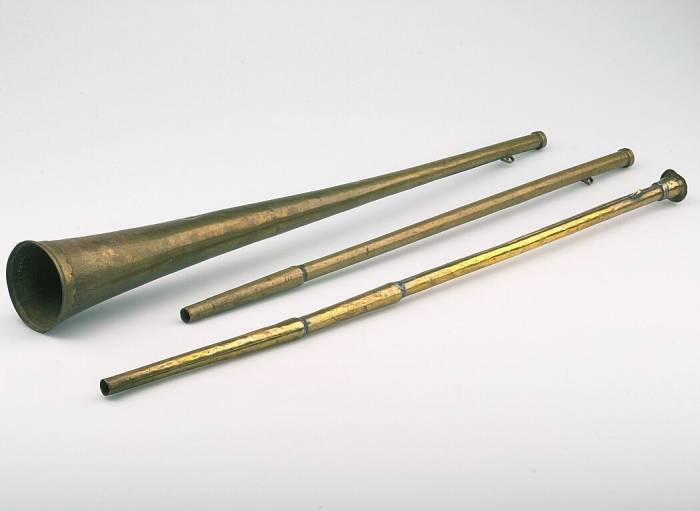File:COLLECTIE TROPENMUSEUM Hoorn van messing TMnr 2439-1.jpg
COLLECTIE_TROPENMUSEUM_Hoorn_van_messing_TMnr_2439-1.jpg (700 × 511 pixels, file size: 141 KB, MIME type: image/jpeg)
| This is a file from the Wikimedia Commons. Information from its description page there is shown below. Commons is a freely licensed media file repository. You can help. |
Summary
| Nederlands: BlaasinstrumentNederlands: Hoorn van messingLocal name: Nafir | |
|---|---|
| Title |
Nederlands: Blaasinstrument Nederlands: Hoorn van messing Local name: Nafir |
| Description |
Nederlands: Deze natuurlijke hoorn van messing bestaat uit drie in elkaar schuivende delen, en wordt toppelings geblazen. Het geluid wordt geproduceerd door de vibraties van de lippen van de speler.
De hoorn (nafir) wordt vooral geassocieerd met de islamitische vastenmaand Ramadan. In Marokko wordt traditioneel het onderbreken van de vastendag (al-iftar) precies na het vijfde en laatste gebed bij zonsondergang, door het blazen op de hoorn aangekondigd. Op dezelfde wijze worden de mensen 's ochtends vroeg weer wakker gemaakt voor de sahoer-maaltijd, de laatste maaltijd voor zonsopgang. De speler (neffar) trekt elke avond gedurende Ramadan door de wijk met zijn hoorn. Zijn dienst wordt pas aan het eind van de maand beloond met de zakat-al-iftar, een liefdadigheidsgave bij het einde van de vastenmaand Ramadan. Dit gebruik vindt men alleen in de stad, en vooral in de oude gedeelte (de medina) en de volkswijken. Op het platteland bestaat het gebruik niet. De functie van dit instrument houdt niet op bij deze rituele handeling. Het wordt ook als muziekinstrument bespeeld door diverse volksmuziekgroepen, zoals bijvoorbeeld de Daqqa Marrakshiyya uit Marrakech, of tijdens gemeenschaps- en privéfeesten, zoals bruiloften en besnijdenissen. |
| Date |
before 1955 date QS:P571,+1955-00-00T00:00:00Z/7,P1326,+1955-00-00T00:00:00Z/9 |
| Dimensions | circa 176cm (69 5/16in.) |
| Accession number |
2439-1 |
| Notes |
Nederlands: Culturele Herkomst: Marokkaans Functionele categorie: aërofonen, aërofonen, aerophones, blaasinstrumenten, blaasinstrumenten, hulpmiddelen bij ritueel etc., ritual attributes Geografische Herkomst: Marokko, Morocco Materiaal - hoofd: messing Objecttrefwoord: hoorns, horns (are usually brass wind intruments) Religieuze herkomst: islam, islamitisch Techniek: Geklonken, Gesoldeerd |
| Source/Photographer | Collectie Stichting Nationaal Museum van Wereldculturen |
Licensing
This file was provided to Wikimedia Commons by the National Museum of World Cultures as part of a cooperation project. The museum brings together the collections of the Tropenmuseum, Afrika Museum and the Museum of Ethnology. It exclusively provides images that are either made by its own staff, or that are otherwise free of copyright.
Bahasa Indonesia ∙ dansk ∙ Deutsch ∙ English ∙ español ∙ français ∙ italiano ∙ magyar ∙ Nederlands ∙ Plattdüütsch ∙ polski ∙ português ∙ sicilianu ∙ Tiếng Việt ∙ македонски ∙ русский ∙ മലയാളം ∙ +/− |
- You are free:
- to share – to copy, distribute and transmit the work
- to remix – to adapt the work
- Under the following conditions:
- attribution – You must give appropriate credit, provide a link to the license, and indicate if changes were made. You may do so in any reasonable manner, but not in any way that suggests the licensor endorses you or your use.
- share alike – If you remix, transform, or build upon the material, you must distribute your contributions under the same or compatible license as the original.
| This file by Tropenmuseum was uploaded as part of the Share Your Knowledge project developed within WikiAfrica. |

|
The categories of this image need checking. You can do so here.
|
Captions
Items portrayed in this file
depicts
image/jpeg
38aac850344b26e46d74d255e1af2795f772cd1b
144,002 byte
511 pixel
700 pixel
File history
Click on a date/time to view the file as it appeared at that time.
| Date/Time | Thumbnail | Dimensions | User | Comment | |
|---|---|---|---|---|---|
| current | 11:28, 21 July 2012 |  | 700 × 511 (141 KB) | M.casanova |
File usage
Global file usage
The following other wikis use this file:
- Usage on ar.wikipedia.org
- Usage on de.wikipedia.org
Metadata
This file contains additional information, probably added from the digital camera or scanner used to create or digitize it.
If the file has been modified from its original state, some details may not fully reflect the modified file.
| Camera manufacturer | NIKON CORPORATION |
|---|---|
| Camera model | Mod NIKON D1 |
| Exposure time | 1/125 sec (0.008) |
| F-number | f/20 |
| Date and time of data generation | 12:05, 11 January 2001 |
| Lens focal length | 70 mm |
| Horizontal resolution | 300 dpi |
| Vertical resolution | 300 dpi |
| Software used | Ver.1.05 |
| File change date and time | 12:05, 11 January 2001 |
| Y and C positioning | Centered |
| Exposure Program | Manual |
| Exif version | 2.1 |
| Date and time of digitizing | 12:05, 11 January 2001 |
| Meaning of each component |
|
| Exposure bias | 0.66666666666667 |
| Maximum land aperture | 3 APEX (f/2.83) |
| Metering mode | Pattern |
| DateTime subseconds | 26 |
| DateTimeOriginal subseconds | 26 |
| DateTimeDigitized subseconds | 26 |
| Supported Flashpix version | 1 |
| Color space | sRGB |
| Sensing method | One-chip color area sensor |

